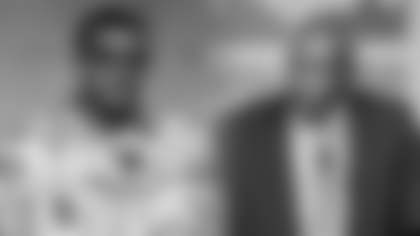When it comes to coaches in the NFL, there's no one who can boast the kind of experience that Mike Munchak has. After all, how many can say they've been coaching in the NFL for more than 20 years and were inducted into the Pro Football Hall of Fame for their playing career? That kind of experience is invaluable to any team, and for the Broncos' offensive line, it will hopefully pay dividends as the group looks to become one of the league's best. Just before the season, we caught up with the legendary former lineman to learn about his perspective on this season and a little bit about his playing career, too.
In this business, we hear a lot about how players transition to new teams, but for a coach, what's that process been like?
"Coming here was the same for me. I've been very blessed. I've been in the league a long time — 35-plus years as a player and coach — and I haven't had to move much. This is my third organization in all those years: Pittsburgh for the last five, and really Tennessee/Houston for [32] years. So I've been very lucky to stay in one spot. It's been great for my family. We haven't had to move as much as most coaches do or most players do.
"Coming here and starting over, it's a great challenge. I look at it as a great opportunity to come here and meet a new group of guys that I get to work with in the meeting room and see what we can develop together, how we can work together and get to know each other, how to motivate each other. That's a great challenge for me as a coach, because all I am is a teacher. Can I make these guys better? Can I make us play well together? Find a group? That type of thing.
"And the coaching staff I have an opportunity to work with, there's a lot of fresh ideas. It's very interesting. I've learned a ton already since being here from [Offensive Coordinator] Rich [Scangarello] and from [RB coach] Curtis [Modkins] and some of the coaching staff, their wealth of knowledge that they have that maybe I haven't been exposed to. And I'm hoping I can do the same for them. I think you become stronger when you bring a lot of different minds together, coaches together, different experiences together.
"And running Rich's offense, but hopefully it's all our offense, blended. I think that's kind of exciting. I enjoy that part, putting it together, pieces of a puzzle. And then you take that message to the players in a unified way. And we'll find out as we go through the season. It's going to be our first game playing all together and then hopefully we'll continue to grow and each week we just get better and better."
When you became a head coach, what was the most difficult adjustment for you?
"I just think that it's like anything; at first it's a feeling-out process. It's just different for everybody, obviously. But it's figuring out how to manage your time. It's a different role that you're not used to being in. You're used to — for me — being O-line coach and being a big part of the offense and having great relationships with maybe just 12-15 guys. All of sudden, now you've got the whole team.
So I think it's just a lot of getting a feel for using your time best, how to motivate the whole group rather than just a small group, scheduling. It's a lot more business to the game. You're kind of taken out of the game a little bit, because it's a lot of logistics: practicing schedules, travel. You don't realize how much of that time that takes away from, because you have to decide how to run your team, how to have them ready, how to have them fresh. There's a lot of firsts going through that. You may have some ideas of how you'd do that when you're the guy, but when you're the guy, you realize there's a little more to it than you thought. It's just interesting going through all of that.
"Like anything, once you get a year or two behind you, you get really good and get better and better at it, just like you do as a coach or as a player. So the longer you can do it, obviously the better you can be at it. Unfortunately in this profession, sometimes you don't get a lot of time. It kind of gets hurried around, so I'm hoping Vic gets an opportunity to be here a long, long time and he'll be one of the best coaches they'll ever have here in Denver, I think, and he's doing a great job so far. I'm enjoying watching him, how well he's handled it. … Heck, I wasn't even sure where to stand on the sideline or what exactly I was going to do on the sidelines, what was going to be the best way to do it. So it's just process of going through it. It all comes naturally after that."
For the offensive line, what would you like their identity to be? Or what do you think the identity is that they have already?
"I want them to be confident, consistent, physical group that plays well together, that knows how to play team football. That it's not about one of us, it's about all five of us — and including the tight ends, including the backs. It's a team protection. It's not just us five doing it. It's going to be the tight ends being involved, the running backs being involved. So the more they realize, 'I can't do it alone. We're in this thing together,' the more that we become that — which we will. …
"So, just that they go out there and have fun, work hard Monday through Saturday, play the game on Sunday and enjoy the game they love to play. Let them play with confidence and play together, and I think that'll be fun to see. No one knows how good they're going to be. Not any team in the league really knows, because every group is a little bit different every year. We all have great expectations and these guys have had a great work ethic and I can tell how hard they've worked from April until now, so I'm excited to see them get started and how we adjust as we have some adversity — because with every game in the NFL comes adversity, and see how we handle those things. The teams that handle that stuff better are usually the teams that are there at the end playing in January and February. We're hoping that we're that group and we feel we can be that group. It's just a matter of us taking that approach to it, one game at a time. Win one, then win the next one and don't worry about the big picture. Don't worry about all the chatter. Just go do our job and do it well. I think these are the kind of guys that'll do that."
You got a chance to look back on your Hall of Fame career recently when you and the team visited the Hall in Canton, Ohio, before the Broncos' preseason opener. What was it like to see your bust and for your players to see it?
"It was kind of a little … embarrassing. It's obviously something I'm proud of, that accomplishment and that honor that obviously no one feels like … you feel humbled by something like that, but that's not something you're thinking about as a player. You just want to do the best you can to be the best you can be when you're playing, be a great teammate. But it was fun, made for a fun day. And that John was there too, it kind of took some of the pressure off me, because obviously John['s bust] was there also. It was fun, and it was fun to play in the game and realize that you're part of the history. And we are — for the players, you realize how you're part of this game and always will be, and it's not just Hall of Fame stuff. There's a lot of great memorabilia in there from a lot of great things that players did throughout their careers. The Hall of Fame's done a great job of celebrating everyone's career and not just Hall of Famers."
Had you gone back since your induction to see that room and your bust?
"Yeah, I try to get back. They make a big deal — and it is a big deal — to be part of when a new class is going in, so I go back quite often since 2001, when I went in. I don't always go to the bust room, and they've done a lot of remodeling and did a great job there. But I try to get back every year so I can be part of the new class going in and meet those guys and have a chance to congratulate them. This gave me a great opportunity; playing in the game made it easy for me to be there for that weekend. I was happy I was able to do that."
Looking back on your playing career, in your first couple of years, you blocked for Earl Campbell, who would also end up in the Hall of Fame. What was that like for you with his style of play?
"He's special. Everyone knew who Earl Campbell was. I feel like I grew up watching him, even though he wasn't that many years ahead of me, really. So for an offensive lineman to get drafted to a team that has that type of runner, it was pretty awesome. And that's how I looked at it. And not only was he a great player; he's a great guy, great to be around and great for the team. For me to block for him a couple years was awesome. It was a great experience."
Your first year with the Oilers must have been particularly extraordinary because it was the strike-shortened season of 1982. What was that experience like?
"I just remember going to my first training camp, and then Gene Upshaw, who was the president of the players union at the time, coming into training camp to talk to us about a possible strike. I didn't really know what was going on. I was just trying to figure out the NFL and into the league. That was my first hearing of it, that this could happen. So obviously I was hoping this wasn't going to happen. Then, after our second game, I think we were 1-1 and had just beaten Seattle, then we went on strike after that game. Very different. I was a young guy in Houston and didn't know what exactly was going to happen or how long it was going to last. It was an interesting start to the NFL."














